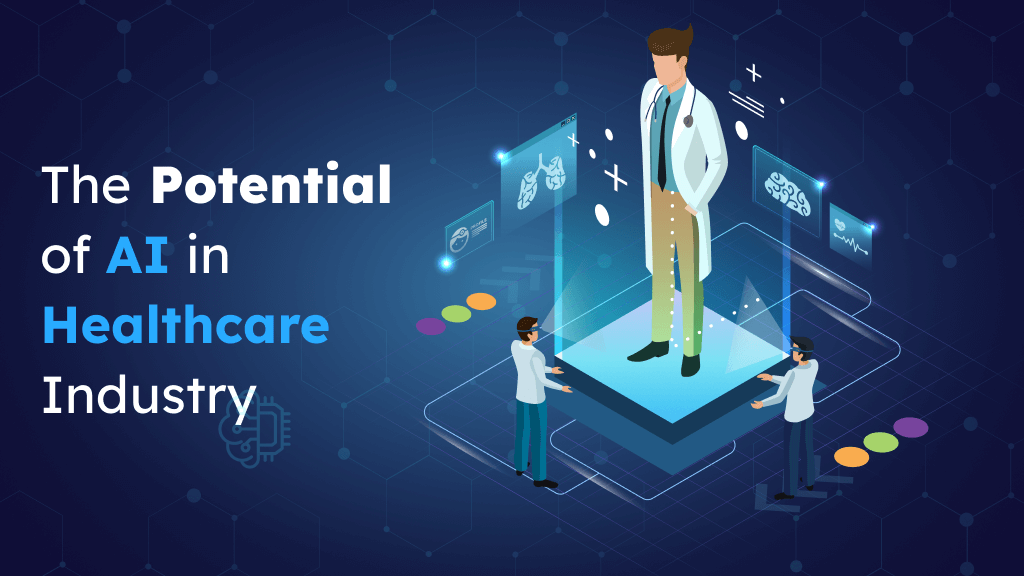
Welcome to Jorie, where the worlds of FinTech and HealthTech seamlessly converge to supercharge your financial processes.

Artificial intelligence (AI) has become a game-changer across various industries, and healthcare is no exception. With the ability to process vast amounts of data, detect patterns, and make informed decisions, AI is revolutionizing the way healthcare providers operate.
Despite the numerous benefits AI can bring to healthcare, its adoption has been relatively slow compared to other industries. The Brookings Institution report states that the slow adoption of AI in healthcare is due to several factors. These include insufficient data infrastructure, regulatory issues, and worries about data privacy and security.
However, recent advancements in technology and a growing awareness of AI's potential are paving the way for its increased adoption in healthcare.
AI has the potential to transform healthcare in several ways, improving efficiency, reducing costs, and ultimately enhancing patient care. Some key benefits of AI in healthcare include:

A recent report by Harvard Business Review and McKinsey & Company estimated that the widespread adoption of AI in healthcare could save the United States healthcare system between $350 billion and $410 billion annually. These savings would come from improved efficiency, reduced waste, and more accurate diagnoses and treatment plans.
Several tech giants and startups are already testing the potential of AI in healthcare. Some notable examples include:

While AI holds significant promise for transforming healthcare, there are still challenges to overcome.
These include addressing data privacy and security concerns, ensuring that AI-driven tools are transparent and free from bias, and establishing clear guidelines and regulations for the use of AI in healthcare. As the industry continues to evolve and address these challenges, the adoption of AI in healthcare is expected to increase.
Another crucial aspect of AI in healthcare is the need for collaboration between healthcare professionals, data scientists, and engineers. This interdisciplinary approach will ensure that AI-driven tools and solutions are developed with a thorough understanding of clinical needs and medical expertise.
In the future, we can expect AI to become increasingly integrated into various aspects of healthcare, from diagnostics and treatment to administrative tasks and resource management. As AI technology continues to advance, its potential to improve patient care and streamline healthcare operations will only grow.

The adoption of AI in healthcare holds immense potential for transforming the industry and improving patient outcomes. As the technology continues to evolve and overcome the challenges it faces, the benefits of AI in healthcare will become increasingly apparent.
From enhanced diagnostics and treatment to optimized resource allocation and telemedicine, AI is set to revolutionize the way healthcare providers operate. By embracing AI and fostering collaboration between medical professionals and technology experts, the healthcare industry can unlock the full potential of AI and create a more efficient, effective, and patient-centric healthcare system for the future.
AI has emerged as a powerful tool in healthcare, helping to revolutionize various aspects of patient care and administrative processes. One of the most significant ways AI is used in healthcare is in diagnostics.
Advanced machine learning algorithms can analyze a large quantity of data. This data can include medical images. The algorithms are able to recognize patterns and abnormalities that could be signs of a disease or condition.
Algorithms can improve the accuracy of diagnoses. This can lead to early detection and intervention, which can improve patient outcomes and result in more efficient healthcare resource use.
Another key application of AI in healthcare is in the development of personalized treatment plans. By analyzing a patient's unique genetic makeup, medical history, and other relevant factors, AI-driven tools can help healthcare professionals design tailored treatment strategies that maximize the likelihood of successful outcomes.
This personalized approach to medicine has the potential to improve patient care by ensuring that each individual receives the most effective therapies for their specific needs.
AI can streamline administrative tasks, such as appointment scheduling and billing, by automating routine processes and reducing the likelihood of human error. This frees up healthcare professionals to focus on direct patient care and makes the healthcare system more efficient overall.

The future of AI in healthcare holds tremendous promise, with the potential to further transform and enhance various aspects of patient care and the overall functioning of the healthcare system. As AI technology continues to advance, we can expect to see several key developments:
AI in healthcare promises significant advancements in diagnostics, treatment personalization, and overall system efficiency.
AI has immense potential to revolutionize healthcare. To ensure this potential is realized, collaboration between healthcare providers, AI researchers, technology companies and regulatory bodies is essential.
This collaboration can help address ethical and data privacy concerns, so AI-driven solutions are accessible and beneficial to all patients.

Media ContactAustin Nasworthyanasworthy@joriehc.com 331-282-1281